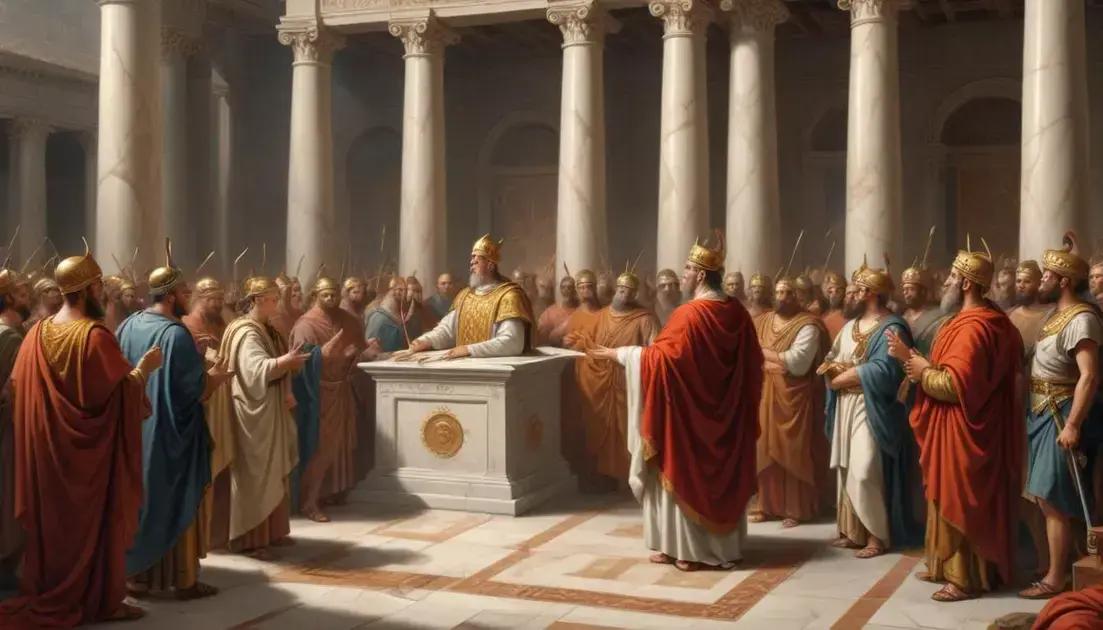
Theodosius and Official Christianity in the Roman Empire
The Edict of Thessalonica, issued by Emperor Theodosius in 380 AD, made Nicene Christianity the official religion of the Roman Empire, significantly impacting pagan practices and culture. This edict led to a decline in pagan worship, social tensions, and the enforcement of new laws against non-Christian practices. Theodosius’s actions fostered a close relationship between church and state, influencing political decisions and shaping future religious conflicts. The long-term effects of this pivotal moment laid the foundation for Christianity’s dominance in Europe, affecting societal structures for centuries.
In 380, Christianity was declared the official religion of the Roman Empire by Emperor Theodosius. This pivotal moment reshaped religious practices forever, prompting intriguing questions about its legacy.
The Edict of Thessalonica
The Edict of Thessalonica was a significant declaration made in 380 AD by Emperor Theodosius. This edict declared Nicene Christianity as the official religion of the Roman Empire. The decision to favor one religion had a massive impact on various aspects of life in the empire.
The Background of the Edict
Before the edict, the Roman Empire had many religions. People followed their own beliefs, including paganism and various forms of Christianity. Theodosius aimed to unify the empire under one faith.
What the Edict Said
The edict stated that all Roman citizens should follow Nicene Christianity. It also set penalties for those who continued to practice pagan rituals. This was a clear shift in how the government viewed religion.
Effects on Pagan Practices
After the edict, many pagan temples were shut down. The followers of old gods faced a lot of pressure to convert to Christianity. This change affected communities deeply, as celebrations and rituals passed down through generations faded away.
The Role of Theodosius
Emperor Theodosius played a key role in this transformation. He wanted to strengthen the empire but also believed in the power of Christianity. By enforcing this edict, he hoped to bring stability and unity.
The Long-term Impact
The Edict of Thessalonica set a precedent for state involvement in religion. Over time, it shaped not just the Roman Empire but also influenced future societies and their approach to faith.
Impact on Pagan Practices
The impact on pagan practices after the Edict of Thessalonica was significant. Many pagans faced pressure to change their beliefs. With Christianity becoming the state religion, traditional practices began to vanish.
Decline of Pagan Worship
As Christian leaders gained power, they frowned upon pagan rituals. Temples that once flourished started to close. The once vibrant celebrations tied to pagan gods were now seen as illegal.
Social Consequences
This shift affected communities deeply. Families who practiced ancient traditions felt lost. They struggled to maintain their identity while faced with new expectations.
Repression and Resistance
Some pagans resisted the change and continued to practice their rituals secretly. They met in hidden places to honor their old gods. This created a divide between followers of Christianity and those who held onto pagan beliefs.
Legal Changes
The Edict also brought about new laws against pagan practices. Punishments were put in place for those who refused to comply. These laws made it hard for communities to practice their beliefs openly.
Long-term Effects
Over the years, many of these pagan practices faded away entirely. The influence of the Edict reached far beyond immediate changes. It laid the groundwork for future religious conflicts and cultural shifts within the empire.
The Role of Theodosius
Theodosius played a key role in the rise of Christianity in the Roman Empire. As emperor, he saw the need for religious unity to stabilize the empire. His actions had lasting effects on Roman society.
Theodosius’s Vision
Theodosius believed that Christianity could unite a divided empire. He thought a single faith would strengthen the loyalty of the people. This belief guided many of his policies during his reign.
Enforcement of Christianity
He actively enforced the Edict of Thessalonica, pushing for Nicene Christianity as the state religion. Theodosius imposed penalties for pagan practices, changing the cultural landscape significantly. This action made a clear statement about his commitment to the faith.
Support for the Church
Theodosius also supported church leaders. He worked closely with them to spread Christianity. His alliances helped Christian bishops gain more power and influence throughout the empire.
Legacy of Leadership
His bold decisions paved the way for future Christian emperors. Theodosius’s reign marked a turning point that affected religious practices for centuries. Even today, his influence is noted in discussions about religion and state.
Long-term Effects on the Roman Empire
The long-term effects of the Edict of Thessalonica on the Roman Empire were profound. This decision changed the landscape of religion and culture significantly. It laid the groundwork for the dominance of Christianity in Europe.
Cultural Shifts
As Christianity spread, many pagan traditions slowly disappeared. People started adopting Christian holidays and practices instead. The empire transformed from a diverse collection of beliefs to a predominantly Christian society.
Political Changes
The rise of Christianity affected government policies. Emperors began to align themselves with Christian leaders. This led to new laws that favored Christianity and limited pagan practices. The balance of power shifted noticeably.
Religious Conflict
Over the years, tensions grew between Christians and pagans. These conflicts sometimes led to violence. The religious divide eventually set the stage for future struggles in Europe during the Middle Ages.
Legacy of Centralization
The centralization of power in religious matters is another lasting effect. The Church began to exert influence over political decisions. This connection shaped the relationship between church and state for centuries.
Influence on Future Empires
The changes that began with Theodosius’s edict influenced later empires. The spread of Christianity reached far beyond Rome. It impacted neighboring regions and helped shape the modern world.
Conclusion
In conclusion, the Edict of Thessalonica marked a turning point for the Roman Empire. By making Christianity the official religion, Emperor Theodosius reshaped the cultural and political landscape. This decision led to a blend of faith and governance that influenced not just Rome but regions far beyond.
The long-term effects included the decline of pagan practices, significant cultural shifts, and the rise of religious conflicts. These changes laid the groundwork for future societal structures in Europe. Ultimately, the Edict’s impact is felt even today as it changed how religion is intertwined with politics.
Understanding this history helps us see the roots of today’s religious dynamics. The story of Theodosius reminds us how powerful leaders can drive change. Their decisions can shape societies and affect generations to come.


